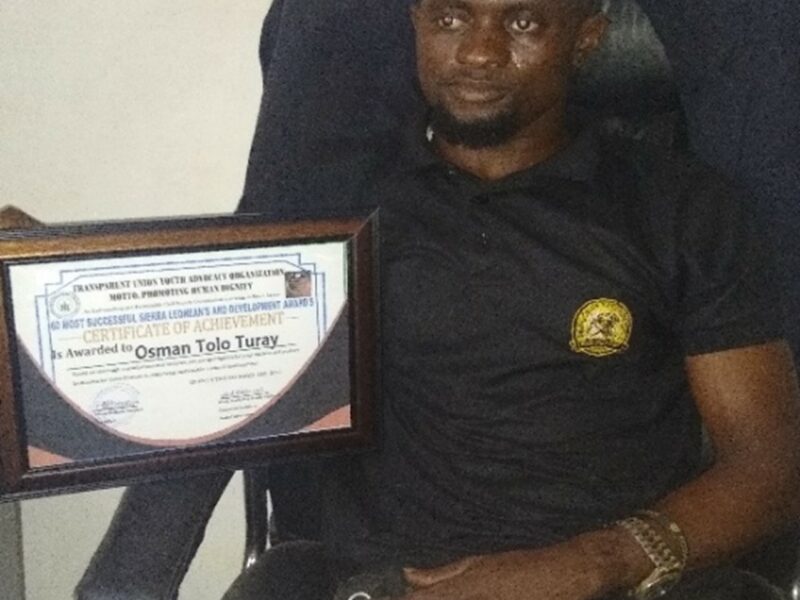Dr. Oloh: Legendary Sierra Leonean Milo Jazz musician
Israel Olufemi Cole was born in the mountainous village of Leicester, on March 20, 1944 in Freetown, Sierra Leone. His parents were poor rural residents, who could not afford to provide him with a basic secondary school education. Cole’s passion and dream was to become a religious minister. But when this seemed far fetched, due to his inferior educational background and dearth of opportunity, he switched his passion to music. He started playing music at the early age of 10. But his ground breaking musical genius, and his proficiency in street music, earned him the accolade ‘Dr. Oloh.’
He played an innovative and infectious trademark brand of ‘Palm Wine’ music, known as Milo Jazz, a hot jumpy version of Gumbay Music. Actually, Milo Jazz music originated from collecting empty Milo-chocolate drink cans, and filling them with stones. The friction between the cans and empty bottles produced the mesmerizing soulful percussion music. That hallmarked the genesis of a novel kind of street music that modernized the existing Gumbay or Maringa brand of music.
Cole probably got his tutelage from the famous king of Gumbay and Maringa music Ebenezer Calendar, the son of a Barbadorian soldier, who had introduced street music in Sierra Leone. But Cole had admired the master musician – Dr. Dynamite (Masokoloko) during his guitar playing sessions. Seemingly, Cole was more determined than ever to introduce his own brand of music, a blend of Caribbean and African flavor. The West Indies was the Mecca of Calypso, Maringa or Gumbay music.
Light, playful, ingenious music could have originated from the Kru, or Creole seafaring, guitar-plucking Africans from Sierra Leone and Liberia. The termination of the Atlantic Slave Trade brought freed slaves from Jamaica to settle in Freetown. While American freed slaves found a sanctuary in Liberia. Slaves from these regions brought with them their dialect, music and culture. Music is a universal language that transcends geographic or linguistic boundaries. It which could be as entertaining as it is therapeutic.
Cole’s contagious music swept through the capital city Freetown, from the 60s onto the 90s. When the gruesome civil war broke out in Sierra Leone and devastated his massive audience and livelihood. His Milo Jazz band constituted tempo bass drum, bass drum, triangles, tenor drum, cans, and bottles. He was the lead vocalist in the band, backed by male voices. His lyrics would become bold and fearless, sometimes as vulgar as they were sensuous, while he addressed the issues of street life: sexual attraction, marriage or political issues that ordinary people experience daily. But he hated war and even became an activist against violence, dictatorship or anarchy. Sometimes he found himself on the uncomfortable pathway of a power conscious government. He was an advocate for peace, unity and happiness. His lyrics are more intuitive than they are cerebral, and generously flavored with brilliant aesthetics and strong cultural imagery.
During the transfer of power from the late Dr. Siaka Stevens to then Brigadier J.S. Momoh, he composed one of his most famous compositions: ‘Momoh nor worry.’
Momoh who gee am power?  Nar God…Momoh nor worry when God Don gee you power – wata wae nar for you nor go run pass you.His compatriots were very uneasy about the blatant and unethical transfer of power from a retiring president to a loyal Brigadier. Momoh seemed pretentious as he was naïve. Cole’s composition seemed an affirmation that his acquisition of power was Divine providence. No stage was big enough for Cole to exhaust his talent and dynamism. He performed at moonlight picnics, carnivals and weddings. And he crafted the ideal, catchy songs for every occasion. During the festive seasons especially at Christmas, his services were in high demand for moonlight picnics. He would divide his group into two wings to make sure that every engagement was adequately covered. His absence could easily ruin an anxiously anticipated festivity
He believed in the sacredness of leadership. And for him the highest authority came from God. Other cultural musicians like S.E. Rogers, Ebenezer Calendar and Salia were not immune from singing the praises of favorite leaders they admired. S.E. Rogers was famous for his song ‘My Lovely Elizabeth’- that is believed to be a dedication to Queen Elizabeth of Britain. But there was actually a homegrown beauty queen in his life, called Elizabeth, who had left him for his friend. Cole had the ingenuity to surprise, and to thrill his audience, by switching from one catchy lyric to another. This earned him applauses and sometimes cash donations. He loved to see his audience fall into a frenzy state of ecstasy. His music was like a long playing medley album.  If Milo Jazz music was his pulpit, then his lyrics were his gospel. Other popular songs include Hallelujah Tumbay, Yawoh Mammy and Ajubah.
In 1989 Cole was awarded the Order of the Rokel (OR) by now deceased President Dr. Joseph S. Momoh, for his contribution to the cultural music of Sierra Leone. Indeed, he had built an impressive musical resume over the years. In 1991 his group performed in England at the Ball Rooms in Leicester Square, London. Eventually, in 1992 he toured the United Kingdom. In 1994 he performed with other Sierra Leonean musicians, at a benefit concert for the late S.E. Rogers. His final international engagement was in 1996, when he performed in London at the Centenary celebration of one of Sierra Leone’s exemplary heroes – Bai Bureh who fought the British fearlessly, during colonial days.
Cole’s home coming call came October 13, 2007. Although he did not have the deep pocket like most famous artists, but his passion for music ran deep within his veins and arteries. He blazed like the Harmattan dry wind fire around the world. He served as an ambassador, who helped to bring people together, or promote the destiny of the human race. His music has influenced a budding new crop of musicians like Emerson Bockarie, famous for his hit song ‘Borbor Belleh.’ Emerson’s lyrical music is as bold as it is fearless, which assaults the conscience of our failing politicians, at the same time addressing the ills of society. Cole’s legacy will bloom like water lies along Africa’s river banks, and the rest of the world throughout timeless ages. Indeed he was Sierra Leone’s gift, who kept on giving. To pluck a chord from the articulate, African American poet, Willie James King * would attribute a well deserved justice to Cole’s legacy and string of achievements.
“I made music. And the music made me.†King’s diction cannot be an overstatement. * Willie James King –Wooden Windows, SRL Press 1999: “I dreamed of Hendrix†page 105-106 Roland B. Marke is the author of two collections of poetry: Teardrops Keep Falling and Silver Rain and Blizzard. His most recent book is Harvest of Hate: Stories and Essays. Marke’s work has appeared in several magazines and journals both print and online publications. Visit his website on: www.rolandmarke.comStay with Sierra Express Media, for your trusted place in news!
© 2010, https:. All rights reserved.






